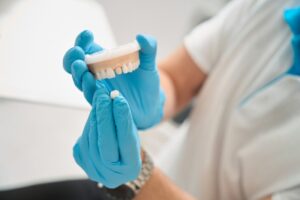
Dental crowns are a popular and effective solution for restoring damaged, decayed, or worn-down teeth. They act as protective caps that cover the visible part of the tooth, restoring its shape, strength, and appearance. But while crowns are designed to be durable, they’re not indestructible. So, how long do dental crowns really last? The answer depends on several factors, including the type of crown, your oral hygiene habits, and how well you care for your teeth. On average, dental crowns last between 10 to 15 years, but with proper care, many can last even longer – up to 20 years or more.
Different Types of Crowns and Their Lifespan
The material used to make your crown plays a big role in its longevity:
Porcelain or ceramic crowns
These are often chosen for their natural appearance and ability to blend seamlessly with your existing teeth. They’re ideal for front teeth, but slightly more prone to chipping than metal options. Average lifespan: 10 to 15 years.
Porcelain-Fused-to-Metal (PFM) Crowns
These combine the aesthetics of porcelain with the strength of a metal base. While durable, the porcelain can still chip or wear away over time. Average lifespan: 10 to 15 years.
Metal Crowns (Gold or Base Metal Alloys)
Known for their strength and resistance to wear, metal crowns are often used on molars. They rarely chip or break but are more noticeable. Average lifespan: 15 to 20-plus years.
Zirconia Crowns
A newer option, zirconia crowns are extremely strong and increasingly popular due to their blend of durability and aesthetics. Average lifespan: 15 to 20 years.
Factors That Affect Crown Longevity
Your crown’s life expectancy isn’t just about the material; it also depends on how you care for it. Here are key factors that influence how long your crown will last:
- Oral hygiene: Brushing and flossing daily prevents decay around the edges of the crown and keeps your gums healthy.
- Diet: Chewing hard objects like ice, pens, or hard candy can damage crowns. Sticky foods can also loosen them.
- Teeth grinding: If you clench or grind your teeth (a condition called bruxism), it can significantly shorten your crown’s lifespan.
- Routine dental visits: Regular checkups allow your dentist to catch any problems early and ensure the crown is still functioning properly.
When Should a Crown Be Replaced?
Even with the best care, crowns may eventually need replacement. Signs you may need a new crown include:
- Visible wear or damage.
- Looseness or shifting.
- Sensitivity or pain.
- Receding gums exposing crown margins.
- Discoloration or aesthetic concerns.
Your dentist will assess the condition of your crown during routine visits and recommend replacement if needed.
Dental crowns are a long-lasting solution for restoring damaged teeth, often providing 10 to 15 years (or more) of durability and function. With good oral hygiene, mindful habits, and regular dental care, your crown can serve you well for many years to come, protecting your smile and boosting your confidence along the way.
About the Author
Dr. Shane Smith is a graduate of the University of Tennessee Health Science Center. Before opening his own dental office, he worked at a variety of different dental offices across Northeast Arkansas, Southeast Missouri, and Memphis, gaining lots of value experience along the way. He has completed hundreds of hours of continuing education through Dentaltown. If it’s time for you to replace your crown, schedule your appointment with us online or call our Jonesboro office at (870) 686-4025.
